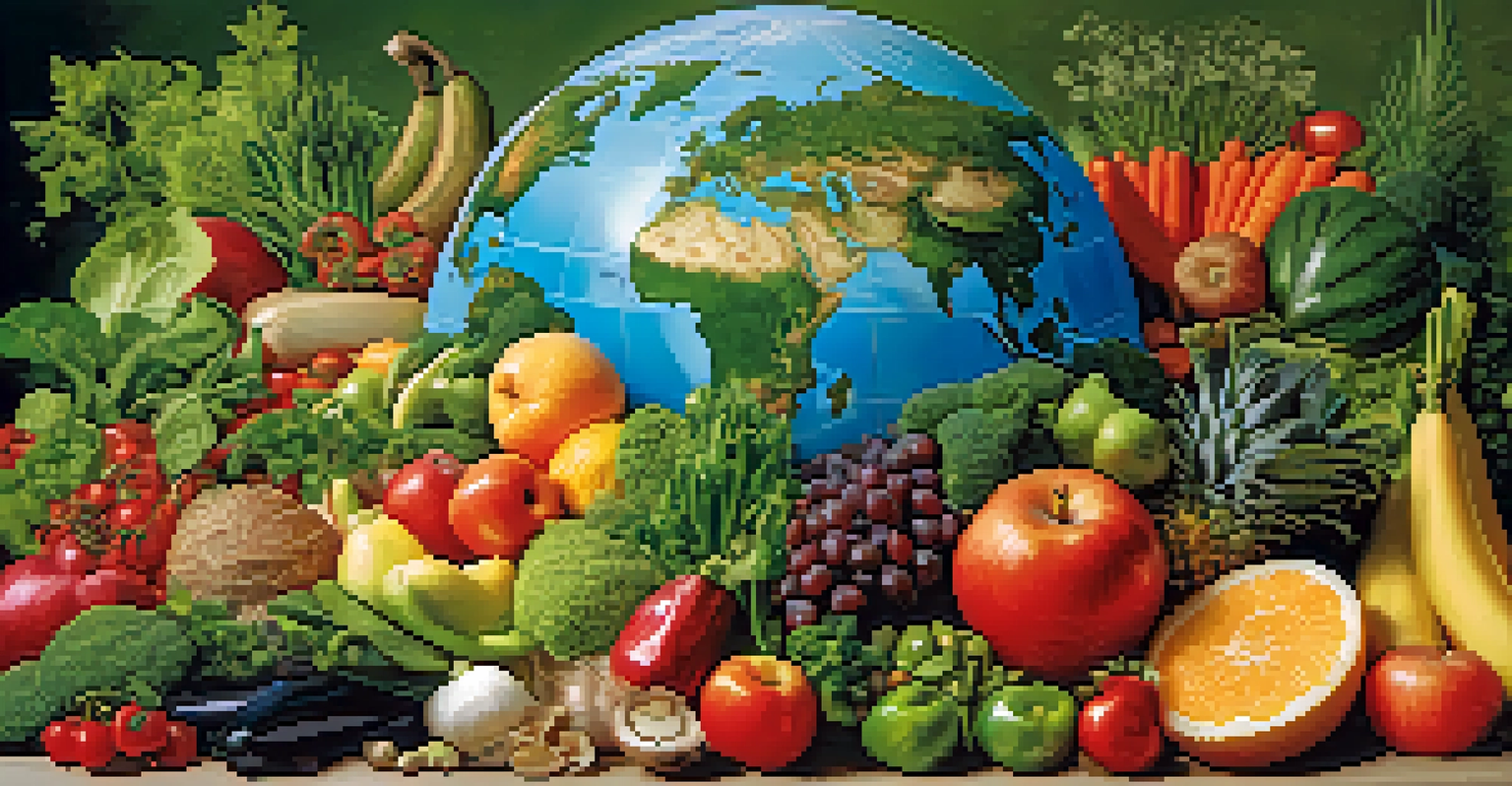The Environmental Benefits of Adopting Plant-based Diets

Reducing Greenhouse Gas Emissions Through Diet Choices
One of the most significant environmental benefits of adopting a plant-based diet is the reduction of greenhouse gas emissions. Animal agriculture is responsible for a large portion of global emissions, particularly methane, which is far more potent than carbon dioxide. By choosing plant-based foods over meat and dairy, individuals can help decrease the demand for livestock farming and its associated emissions.
Eating less meat is the most effective way to reduce your impact on the planet.
For instance, a study by the University of Oxford found that switching to a vegan diet could cut an individual's carbon footprint from food by up to 73%. Imagine if more people made this switch; it could lead to a substantial decrease in overall emissions, helping to combat climate change effectively.
In essence, your dietary choices can have a ripple effect on the planet. Each meal featuring plants instead of animal products contributes to a larger movement towards sustainability and a healthier atmosphere.
Conserving Water Resources with Plant-Based Eating
Water scarcity is a pressing issue worldwide, and the food industry is a major contributor to this challenge. Producing meat requires significantly more water than growing vegetables or grains. For example, it takes about 1,800 gallons of water to produce just one pound of beef, while a pound of vegetables requires only about 39 gallons.

By shifting towards a plant-based diet, individuals can help conserve precious water resources. This is particularly important as we face increasing droughts and water shortages in various parts of the world. Every plant-based meal you choose is a step towards more responsible water usage.
Diet Choices Reduce Emissions
Adopting a plant-based diet can significantly lower greenhouse gas emissions, playing a crucial role in combating climate change.
So, when you opt for a veggie stir-fry instead of a steak dinner, you’re not just making a healthier choice for yourself; you’re also playing a part in preserving our planet's water supply for future generations.
Preserving Biodiversity Through Dietary Choices
Biodiversity is essential for a healthy ecosystem, but animal agriculture poses a significant threat to various species and habitats. Forests are often cleared to create pastures or grow animal feed, which disrupts local wildlife and contributes to habitat loss. By adopting a plant-based diet, you can help mitigate this issue.
The future of food is plant-based. We can feed the world and reduce climate change by shifting our diets.
For instance, when land is used to cultivate plant-based foods instead of livestock, it can support a wider range of species and promote healthier ecosystems. A diverse range of plants in our diets can also encourage sustainable farming practices that benefit the environment.
Choosing plant-based foods contributes not only to your health but also to the health of our planet’s ecosystems. Every bite counts in the fight against biodiversity loss.
Mitigating Soil Degradation Through Plant-Based Agriculture
Soil health is crucial for sustainable agriculture and food security. Traditional livestock farming often leads to soil degradation, as overgrazing and intensive farming practices can strip the land of its nutrients. In contrast, plant-based agriculture can promote healthier soil through crop rotation and other sustainable practices.
By embracing a plant-based diet, you support farming systems that focus on soil restoration and conservation. For instance, growing legumes enriches the soil with nitrogen, improving its quality for future crops.
Plant-Based Diets Conserve Water
Shifting to plant-based eating helps conserve water resources, as producing meat requires vastly more water than growing vegetables.
In a nutshell, choosing plant-based foods not only benefits your health but also nurtures the very ground that sustains our food systems. Healthy soil means a healthier planet.
Lowering Pollution Levels with Plant-Based Diets
Animal agriculture is a significant source of pollution, contributing to air, water, and soil contamination. Fertilizers and waste from livestock can pollute waterways, leading to harmful algal blooms and dead zones. By choosing plant-based options, you can help reduce these pollution levels.
For instance, studies have shown that plant-based farming practices generally produce less runoff and are more environmentally friendly. This means cleaner water sources and healthier ecosystems for all living beings.
Ultimately, your dietary choices can help create a cleaner, more sustainable environment. Each plant-based meal has the potential to reduce pollution and protect our natural resources.
Supporting Sustainable Farming Practices with Plant-Based Foods
When you adopt a plant-based diet, you often support more sustainable farming practices. Many plant-based farms focus on organic methods, which prioritize environmental health and biodiversity. These practices can lead to healthier soils and reduced reliance on synthetic fertilizers and pesticides.
In addition, supporting local plant-based farmers can strengthen communities and economies. Choosing to buy seasonal, locally-produced vegetables helps reduce transportation emissions and supports sustainable practices in your area.
Support Biodiversity with Plants
Choosing plant-based foods helps preserve biodiversity by reducing habitat loss associated with animal agriculture.
In essence, your food choices can directly impact the farming methods used in your community. By opting for plant-based, you become part of a movement that prioritizes sustainability and environmental stewardship.
Enhancing Global Food Security Through Plant-Based Diets
Food security is a global challenge, and animal agriculture is resource-intensive, often diverting grains and land away from direct human consumption. By adopting a plant-based diet, you can help contribute to a more equitable food system. Producing plant-based foods requires fewer resources and can feed more people per acre than animal products.
For example, the United Nations suggests that a shift towards plant-based diets could significantly alleviate hunger and malnutrition worldwide. By focusing on crops that can be consumed directly rather than fed to livestock, we can maximize food production efficiency.

Ultimately, choosing plant-based diets can help pave the way for a more sustainable and fair global food system, ensuring that everyone has access to nutritious meals.
Making Personal Choices for a Greener Future
The decision to adopt a plant-based diet is a personal one, but it carries significant implications for the environment. Each meal is an opportunity to make a positive impact on the planet. Whether you're a full-time vegan or simply looking to incorporate more plant-based meals into your routine, every little change counts.
Start small by trying a new plant-based recipe once a week or swapping meat for a plant-based protein in your favorite dishes. You may find that incorporating more fruits, vegetables, and grains into your diet is not only beneficial for the environment but also delicious and satisfying.
In the end, embracing a plant-based diet is a powerful way to contribute to a healthier planet. Your choices can inspire others and create a collective movement towards sustainability and environmental consciousness.